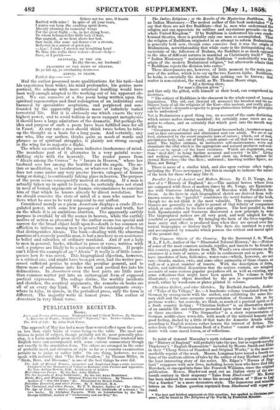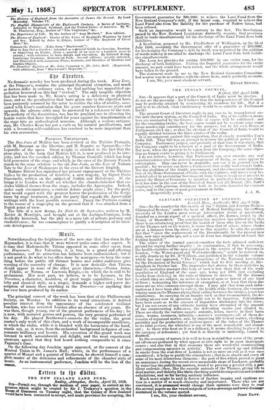PUBLICATIONS RECEIVED.
BOOKS.
Poets and Poetry of Germany. Biographical and Critical Notices. By Madame L. Davesies de Pontes, Translator of "Egmont," &c. In two volumes.
The Web of Life. By Allan Park Paton.
The approach of May has had a more than wonted effect upon the poets, no less than eight books of verses being on the table. The most am- bitious in point of subject, though probably not thJ most generally plea- sing, is a Latin monkish poem on the life of a Saint Franco rendered into English verse and accompanied with some curious commentary though not exactly in the annotation form. The others are arranged in the order of probable merit and elevation of style so far as a cursory examination permits us to judge or rather infer. On one thing, however, we can speak with certainty that "The Dead Swallow," by Thomas Miller, in "Birds, Bees, and Blossoms," is one of the best things he ever did.
The Life of Blessed Franco, extracted and Englished from a verie Anciente Chronicle of the Monastery of Vinare in Brabant, with Preface and Appendix. By Yen. Arthur Bowen, D.D., Archdeacon of Ardfert.
Miscellaneous Poems. By the Rev. John Mitford. The Six Legends of King Goldenstar. By the late Anna Bradstreet. Birds, Bees, and Blossoms. Original Poems for Children. By Thomas Miller, Author of " Our Old Town," Bre. Illustrated by Birket Foster. Palestine Revisited, and other Poems. By T. Mitchell, M.A. The Christiad, and other Poems. By T. N. Beasley, Author of "The Abbey." The Age of Lead, a Satire, (delivered under the similitude of a dream.) In two books. By Adolphus Pasquin. With an Introduction by the Rev. George Gilffilan, Author of" Christianity and our Era," &c. The Indian Religions ; or the Results of the Mysterious Buddhism. By an Indian Missionary.—The modest author of this book undertakes " to say that there are not five Buddhists—that is, men who understand the religion and can appreciate its sublime and mysterious grounds—in the whole United Kingdom." If by Buddhism is understood his Gym. crack. brained theories, there is probably only one man so accomplished, That the religion of Buddhism originated in an attempt to reform Brahminism, is generally held now, though some conceive that it was the origin of Brahminism, notwithstanding that while caste is the distinguishing cha- racteristic of the followers of Brahma, the Buddhist is as much opposed to the idea of different natures in mankind as Christianity itself.* The "Indian Missionary" maintains that Buddhism "undoubtedly was the origin of the modern Brahminical religion," but afterwards admits that "Buddhism rejects the division into castes." These discrepancies are, however, of little moment to the main per. pose of the author, which is to cry up the two Eastern faiths. Buddhism, he holds, is essentially the doctrine that nothing can be known; that matter is non-existent, the world, as Mr. Thomas Moore sings, "All a fleeting show, For man's illusion given"; and that only the gifted, with himself at their head, can comprehend its doctrines.
"The subject of Buddhism is the obscurest in the whole round of learned inquisition. This old, and (beyond all measure) the broadest and the SU* blimest basis of all the religions of the East—this ancient, and really Wk. sophical belief—demands a capacity to grasp abstractions before its principles can be understood."
Yet is Brahminism a good thing too, on account of the caste distinction which nature makes among mankind; for certainly some races are sn. perior to others, and as certainly that which goes into the mouth may defile us.
"Creatures are of that they eat. Aliment becomes body ; becomes as much soul as that circumstantial and eliminated soul can admit. We are of our food, elaborated by the secret magnetic laws of nature; which, out of food, precipitates body, and, out of body, extols mind—or all that we can know as mind. The higher animals, in instinctive self-maintenance, scorn and abominate the offal which is the appropriate and natural producer and soul- maker—so to speak—of the baser creatures. Which are degenerate, even from dead dirt, in being further accursed and convict in life.' Living and walking corruption, affirmative and risen up, defiant, against the eternal Matterless—the One Rest ; unformed ; knowing neither Space, nor Time, nor Being."
There is more of a similar kind, and also upon various other topics, including the Times newspaper but this is enough to indicate the nature of the book for those who may like it.
Parallel Lives of Ancient and Modern Heroes. By C. D. Yonge, Au- thor of a "History of England," &c.—The ancient heroes whose lives are compared with those of modern times by Mr. Yonge, are Epaminon- das with Gustavus Adolphus, Philip of Macedon with Frederick the Great. As the facts in each biographical sketch are derived from well- known sources, the " parallel " constitutes the novel feature of the book, though we do not think it the most valuable. The respective resem- blances are generally too slight to permit of that felicity of comparison which at once strikes by its force and aptness. The best parallel is, that both Eparabiondas and Gustavus discovered a new principle in war. The biographical notices are all very good, and well adapted for the youthful or general reader. By bringing the facts of the lives together, more unity and effect is produced than when they are spread over his- torical biographies or history itself. The facts are narrated in a style and accompanied by remarks which possess the critical and moral spirit of the present day.
The Common Objects of the Country. By the Reverend J. G. Wood, M.A., F L.S., Author of the Illustrated Natural History," &c.—Notices of some of the most common animals, reptiles, and insects to be found in this country, generally drawn from Mr. Wood's own observations on the creatures in a state of nature, or while in confinement and as pets. We have anecdotes of bats, field-mice, water-rats—which, however, are not rats—lizards, snakes, ewts, and some other animantia of these classes, as well as of a great number of insects. With the description of farm, habits, and individual disposition that the notices contain, are mingled accounts of some curious popular prejudices old as well as existing, and some reflections that might have been spared. The volume is fully illustrated ; every object described by the pen is represented by the pencil, either by wood-cuts or plates printed in colours.
Christian Gellert, and other Sketches. By Berthold Auerbach, Author of "Tales of the Village," &c.—A handsome volume translated from the German by arrangement with the author, and exhibiting the same lite- rary skill and the same accurate representation of German life as his previous works ; but scarcely, we think, so much of a poetical spirit or of
a fresh country feeling ; Christian Gellert" is an illustrative sketch of an amiable life and character grounded upon what may be called two or three anecdotes. "The Stepmother" is a story representative of German middle-class town-life, with much of the national honesty and good feeling, dashed by a little of that taste for domestic details which according to English notions rather lowers the interest of fiction. The notes from the "Memorandum Book of a Pastor" consist of single hid- dents with some moral lesson, or of reflections.
In point of demand Macaulay's sixth volume of his popular edition of the "History of England" will probably take the pas, but as regards novelty Thackeray's "English Humourists " included by Messrs. Smith and Elder in their "Cheap Series of Standard and Original Works," is the most re- markable reprint of the week. Messrs. Longman have issued a fourth vo- lame of the uniform edition of tales by the author of Amy Herbert ; and not the least interesting story of the series. Mr. Edgar's Heroes of Eng- land" reappears with new lives including heroic men who have died like Havelock, or emerged into fame lives, Fenwiek Williams, since the original publication. Messrs. Blackwood send out an Italian story of the six- teenth century in their sixpenny "Tales from Blackwood.' Mr. KemP has been induced by success to issue his second edition of "How to 14 Out a Garden" in a more decorative style. The humorous and sensible letters on the Indian question reprinted from Blackwood will repay Pe" rasal.
* The best and briefest argument on this question, but applied to ithristiatt Pur- pose s , will be found in The Religions of the World, by Frederick Matinee. The History of England from the Accession of James the Second. By Lord Macaulay. Volume VI. The English Eitesourists of the Eighteenth Century. A Series of Lectures, delivered in England, Scotland. and the United States of America. By W. M. Thackeray, Esq., Author of "The Virginians," &c.
The Experience of Life. By the Author of" Amy Herbert." New edition. The Heroes of England : Stories of the Lives of England's Warriors by Land
and Sea. Edited by John G. Edgar, Author of "The Boyhood of Great Men," Re.
Colonna the Painter. (Tales from "Blackwood.") How to Lay Out a Garden: intended as a general Guide in choosing, forming, or improving an Estate, (from a quarter of an acre to a hundred acres in extent,) with reference to both, design and execution. By Edward Kemp, Landscape Gardener, Birkenhead Park. Second edition : greatly enlarged, and Illustrated with numerous Plans, Sections, and Sketches of Gardens and Garden Objects. The Familiar Epistles of Mr. John Company to Mr. John Bull. (Reprinted, with additions, from" Blackwood's Magazine.")



































 Previous page
Previous page